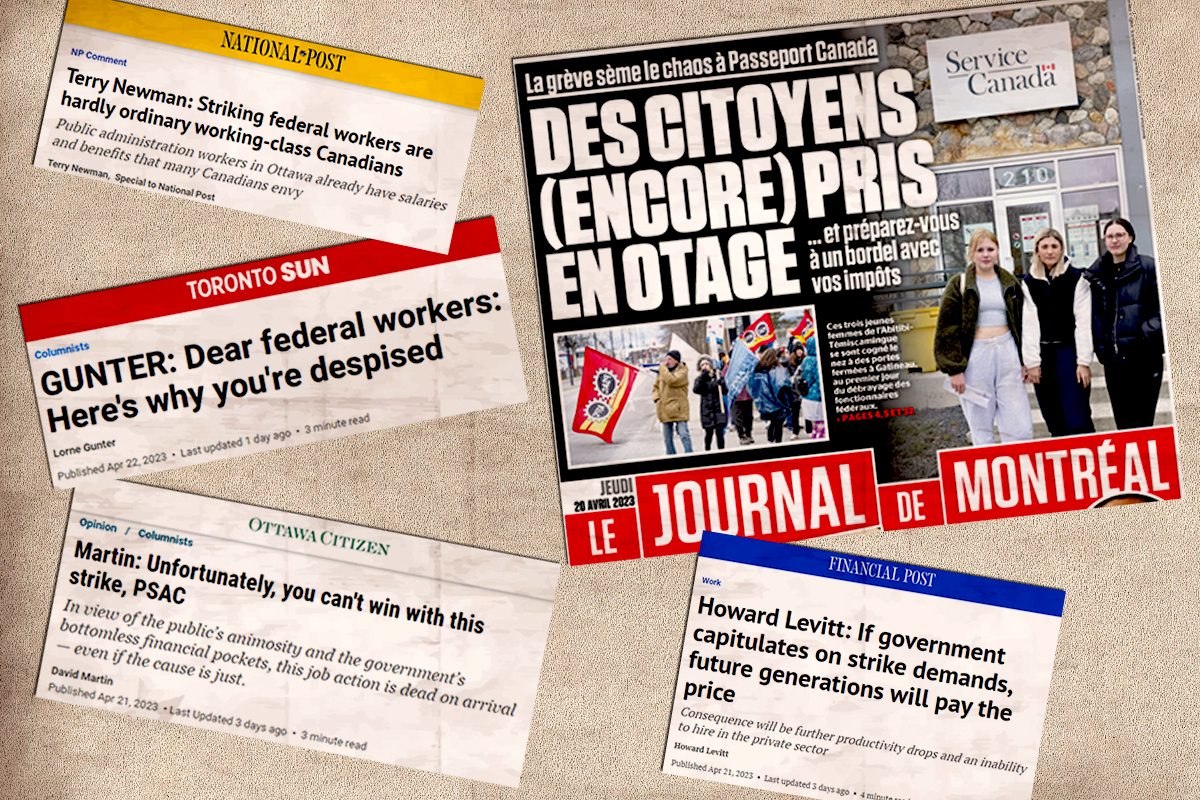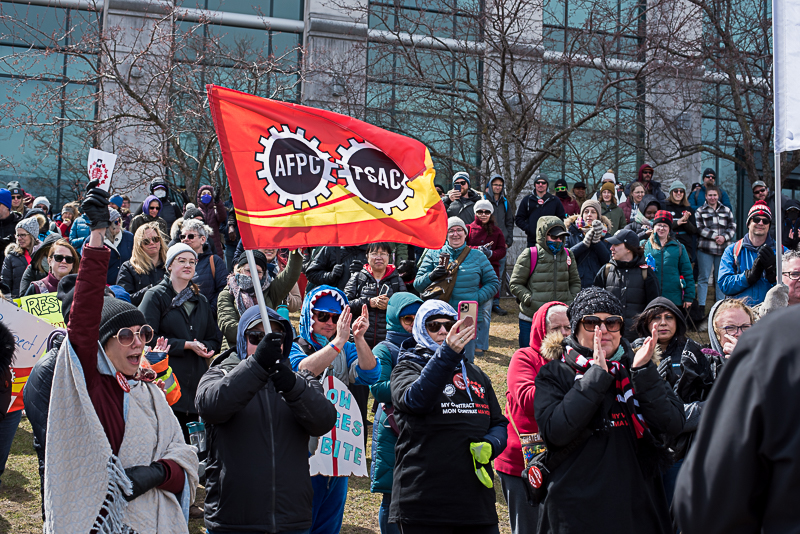
“Strike causes chaos at Passport Canada: Citizens taken hostage (again)… and get ready for tax season to get messy”
—Journal de Montréal
“Striking federal workers are hardly ordinary working-class Canadians”
—National Post
“If government capitulates on strike demands, future generations will pay the price”
—Financial Post
“Unfortunately, you can’t win with this strike, PSAC”
—Ottawa Citizen
“Dear federal workers: Here’s why you’re despised”
—Toronto Sun
In the face of the historic mobilization of 155,000 federal public service workers, the bosses’ press has mobilized its full arsenal of anti-strike arguments—on every platform, in every newspaper, on every radio and TV station. Everywhere, the “experts” are working overtime to turn the public against the strikers.
Canadian workers need to reject these voices of contempt and demoralization. Our brothers and sisters of the Public Service Alliance of Canada (PSAC) need the support of the entire labour movement in their struggle.
Fear-mongering
In every strike, the media, following the lead from the government and the bosses, tries to sow doubt and fear about the economic impact it will have.
The Toronto Star, for example, headlined its article on the third day of the strike “Will the PSAC strike kick-start a recession?”, citing “experts” who “worry” about this possibility.
Never mind the fact that it is the Bank of Canada which is increasing interest rates and deliberately trying to provoke a recession. One “expert”, Derek Holt, said that the Bank of Canada “will never say it but I think they’re perfectly willing to court recession in the backs of their minds.” Now this very same “expert” is quoted by the Star arguing that it is the strike that could cause an economic contraction! The hypocrisy of these lackeys of capitalism knows no bounds.
In addition to being blamed for a potential recession that the Bank of Canada was already trying to bring about, PSAC workers are being told that they are only making inflation worse with their allegedly excessive wage demands. A Globe and Mail analyst scornfully states, “If striking bureaucrats get their pay raises, inflation might never end.” Neither more nor less!
We have already explained elsewhere that, from the standpoint of both economic theory and facts, it is entirely false that higher wages lead to higher inflation. But federal public service workers are the last workers against whom such a lie can be used.
Indeed, federal workers have seen their inflation-adjusted real wages stagnate since 2007. The rich, on the other hand, have never been so rich, having been showered with billions of dollars of public money by the federal government during the pandemic. It is the capitalists and their governments who are responsible for inflation.
Division and contempt
It is not enough for the rich and powerful to spread fear. They have to divide the workers, to turn the rest of the working class and the poor against the strikers.
This is what the National Post article mentioned above does: “Striking federal workers are hardly ordinary working-class Canadians”.
The article explains that “Government administrators, cubicled and lattéd, are not the first thing people picture when considering the drudgery of the working class.”
Thus, this press of the rich who despise the workers suddenly seems very interested in the fate of the “real” workers. The same people who usually say that the working class “doesn’t exist” invoke the misery of that same working class against the allegedly “privileged” workers.
The article goes on to compare the salaries of Canada Revenue Agency workers with those of call centres, in order to show the “privileges” enjoyed by federal employees. This is typical.
The dockers in Montreal were also told that they had good wages and should just shut up when they went on strike in 2021. The students during the 2012 strike in Quebec were also slandered as spoiled brats. Regardless of which stratum of the population goes on strike, the capitalist media will always seek to portray them as privileged whiners.
The reality is that a gain for one part of the working class inevitably has a positive impact on the rest. When workers win, it excites and encourages other layers to join the struggle. Higher wages in the public sector put upward pressure on everyone’s wages.
We can never let the capitalists make the argument that one layer of workers doesn’t deserve gains “because” others are poorer.
Slander
In addition to the so-called economic arguments and the attempts to divide the workers, there is another thread to exploit: presenting the strike as illegitimate or the work of a minority.
It is CBC/Radio-Canada who got the ball rolling with an article stating that “only” 35 per cent of striking workers participated in the strike vote. Worse, “irregularities” were alleged to have taken place during the vote.
But the vote is unequivocal: 80 per cent of these members voted for the strike. Workers need no lessons on the legitimacy of their mobilization, as they face a minority government supported by only 20 per cent of the voting age population. We must reject this slander.
Another example of slander and divisiveness is a news item that has been circulating according to which 1,500 Indigenous students are currently out of school because their schools are governed by Indigenous Services Canada, which happens to be on strike. The CBC has also picked up on these divisive arguments, headlining that the strike is putting these poor Indigenous students “out of class”. This news story is a shameful attempt to appeal to sincere sympathy for the Indigenous cause to turn people against the strike.
In general, the role of the CBC in this strike is particularly pernicious, as they pride themselves more than anyone else on their “independence”. But as Trotsky once explained:
“The yellow press lies as a matter of course, without hesitating or looking back. Newspapers like The Times or Le Temps speak the truth on all unimportant and inconsequential occasions, so that they can deceive the public with all the requisite authority when necessary.”
Such “neutral” or “respectable” media like the CBC/Radio-Canada play a potentially more important role in shaping public opinion than the more crass tabloids like the Sun newspapers or the Journal de Montréal, precisely because of their veil of independence. But in the last analysis, they will act as a voice of the capitalist and their governments when it is important that they do so.
Support
Faced with such a media and political barrage, it would not be surprising to see a majority of the population turn against the strike.
Yet this is not what seems to be happening. A recent poll showed strong support for PSAC’s demands.
In fact, 55 per cent of Canadians support federal workers’ demand to be able to work from home, while only 36 per cent are opposed. On the issue of wages, the main one that all the media are focused on, 48 per cent of Canadians support PSAC’s demands, while only 40 per cent oppose them. This is great news.
The strike still appears to be at an impasse. For this reason, the union is preparing to escalate the struggle. The ports of Montreal and Vancouver were disrupted today. On a Montreal picket line this morning, PSAC executive regional vice-president for Quebec Yvon Barrière said that if the dispute continues, workers will shut down customs. Such an escalation is exactly what we need!
What are they really afraid of?
Not every single strike gets such an immense outpouring of hatred, contempt, and lies on every conceivable platform.

But here and there, we can find evidence of what really worries the capitalists and their mouthpieces about the PSAC strike.
For instance, the editor of Le Devoir, in his piece on the strike, explains: “Ottawa must not give in to pressure from the Public Service Alliance of Canada (PSAC), and must bear in mind that its actions will have a ripple effect on union mobilization across the country.” (emphasis added)
That is what is at stake in this strike. If workers win their right to work from home, it will set the tone for negotiations on this issue in the private sector too. If workers win their wage demands, it will encourage other sectors of the working class in their struggles against inflation. In the current period of deep crisis of the whole capitalist system, the ruling class has no wiggle room for concessions. With the economy in bad shape, they hold on dearly to every penny, and they fear the working class fighting back. They cannot let such a significant layer of the working class as the public service show that victory is possible.
This is why we should expect the government to eventually step in and introduce back-to-work legislation. This supposedly worker-friendly government has already appealed to federal workers to cross picket lines by encouraging them to work from home (despite fighting against that right in the current negotiation!), and they won’t stop there.
The broader labour movement has a crucial role to play in organizing the fightback. All union federations must do what is necessary to mobilize their members on the pickets, at the ports, and in other PSAC mobilization activities. This will be even more important in the event of back-to-work legislation. Active solidarity will be needed to successfully defy such legislation!
The PSAC strike is already historic. But what remains is for it to go down in history not as a defeat, but as an inspiring victory for the entire working class.
Solidarity with PSAC workers!
Strike until victory!
Defy back-to-work legislation!

